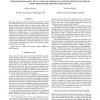Free Online Productivity Tools
i2Speak
i2Symbol
i2OCR
iTex2Img
iWeb2Print
iWeb2Shot
i2Type
iPdf2Split
iPdf2Merge
i2Bopomofo
i2Arabic
i2Style
i2Image
i2PDF
iLatex2Rtf
Sci2ools
ICASSP
2011
IEEE
2011
IEEE
Speaker similarity evaluation of foreign-accented speech synthesis using HMM-based speaker adaptation
This paper describes a speaker discrimination experiment in which native English listeners were presented with natural and synthetic speech stimuli in English and were asked to judge whether they thought the sentences were spoken by the same person or not. The natural speech consisted of recordings of Finnish speakers speaking English. The synthetic stimuli were created using adaptation data from the same Finnish speakers. Two average voice models were compared: one trained on Finnish-accented English and the other on American-accented English. The experiments illustrate that listeners perform well at speaker discrimination when the stimuli are both natural or both synthetic, but when the speech types are crossed performance drops significantly. We also found that the type of accent in the average voice model had no effect on the listeners’ speaker discrimination performance.
| Added | 21 Aug 2011 |
| Updated | 21 Aug 2011 |
| Type | Journal |
| Year | 2011 |
| Where | ICASSP |
| Authors | Mirjam Wester, Reima Karhila |
Comments (0)

